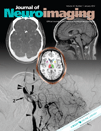Arterial ReOcclusion and Persistent Distal Occlusion after Thrombus Aspiration
J Neuroimaging 2012;22:92-94.
Abstract
ABSTRACT
BACKGROUND AND PURPOSE
Early reocclusion of intracranial arteries can lead to poor clinical outcome. We report reocclusion detection after endovascular clot aspiration, followed by administration of GPIIb-IIIa antagonist under continuous ultrasound monitoring.
CASE DESCRIPTION
A 73-year-old man developed the right middle cerebral artery (MCA) occlusion with NIHSS 17 points, 6 days after aortic valve replacement. Recanalization was achieved with Penumbra™ system and reocclusion was detected with transcranial Doppler (TCD) 30 minutes postcompletion of intra-arterial procedure. Proximal recanalization was achieved with the second thrombus aspiration while M2 MCA occlusion persisted beyond the reach of the device. Intravenous abciximab was administered under continuous TCD monitoring. Recanalization with Thrombolysis in Brain Ischemia (TIBI) flow grade 4 was observed at 60 minutes postintervention accompanied with clinical recovery to NIHSS 3 points. Abciximab was given for 12 hours with no hemorrhagic transformation on repeat CT scan. Patient was discharged home with mild left pronator drift and facial droop, and his modified ranking score was 1 at 6-week follow-up visit.
CONCLUSIONS
Early arterial reocclusion can occur after successful thrombus aspiration while GPIIb-IIIa antagonist administration may lead to subsequent recanalization of persisting distal occlusions not amenable to mechanical removal.




